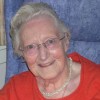
Dame Cicely Saunders died at St Christopher’s Hospice on 14 July 2005, at the age of 87. This is an interview I recorded with her just a few months earlier.
I first met Dame Cicely in 1995 and over the next decade we worked together on various projects. She was a keen supporter of my work on hospice history. She provided some key ‘on the record’ interviews that were the beginnings of what became an extensive collection of oral history material.
We also collaborated on the initial cataloguing of over 60 archive boxes of her papers and materials – work that is now being concluded as an extensive archive of her material is brought together at King’s College London. There were volumes of her letters and her selected papers, published by Oxford University Press, as well as the remarkably popular book Watch with Me, which has now been translated into four languages, with more in the planning.
In the last few years of her life I conducted several interviews with her in preparation for writing a new biography. These recordings include fascinating recollections, as well as descriptions of her life at that time.
To mark the tenth anniversary of Dame Cicely’s death, we are posting here a short extract of the very last interview I did with her. It was recorded on 9 March 2005 at the St Christopher’s Hospice, four months before she died.
I did manage to visit her again at the hospice, in June 2005, to say our last goodbyes.
At the beginning of next year I will start in earnest on the biography. The extract here is a wonderful illustration of why that book needs to be written. I hope that you enjoy listening to this as much as my colleagues and I did.
David Clark
Read more about the life and works of Dame Cicely Saunders in this biographical article by David Clark, also published today to mark the anniversary of her death, entitled Works of Love: Cicely Saunders and the hospice movement for openDemocracy.net
You may also like Love, care and compassion – the legacy of Dame Cicely Saunders, published today on ehospice.com.


Voluntary refusal of food by a dying person is her body signaling the lack of need or ability to digest food. It is not assisted dying. It is the body advancing through the dying process. We must honor these signals by a person’s body by allowing the withdrawal of food. I find that swabbing the patients mouth with juice relieves it’s dryness and brings comfort to the person. The body readily accepts the few calories in the juice without rejecting them. The most important aspect is that the juice brings comfort even in the midst of dying. This is compassionate care. Make note, if the patient is refusing food, this is not the same as assisted dying. The body knows how to die and when it is time to shut down the digestive process.